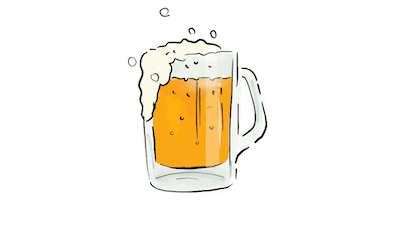Does Beer Have Lactobacillus Probiotic Bacteria?
One of the best ways to get a diverse range of probiotic bacteria is through eating fermented foods like Kimchi, Sauerkraut, and Yogurts and from probiotic drinks like Kefir milk.
Beer also undergoes a similar fermentation process from involves using probiotic yeasts like Saccharomyces Sastorianus to convert glucose into ethyl alcohol.
So does this mean that all beers have gut-friendly Lactobacillus strains or probiotic yeast like Saccharomyces that have been studied for conditions like Irritable Bowel Syndrome?
Does All Beer Contain Probiotic Bacteria?

Cold Glass Of Beer
Not all beers contain probiotic bacteria that are beneficial for the gut. To figure out what beers contain probiotics we need to look at the brewing process to see how the beers were fermented and with what types of hops & starter yeast.
The hop iso-α-acid hops in most beers don't come from yeast and may kill off the gut-friendly bacteria strains before any liquid even touches your lips. In recent years, however, people like Professor Eric Claassen from Amsterdam University have shown that strong beers fermented twice may have yeast probiotics.
What Beers Contain Probiotic Bacteria?
Beers fermented twice need to use either Saccharomyces yeast, Kluyveromyces fungus, or Lactobacillus bacteria as a starter culture but the secret is doing this during the second fermentation. This may create an acid that kills off bad bacteria and lets the probiotics thrive during the second fermentation process.
It's similar to how probiotic drinks like kefir and kombucha are made but for the most part, the amazing Lactobacillus bacteria isn't mostly used to ferment beer. Instead, it is a yeast that is used most commonly in Belgian beers. If you are experienced in home brewing beer then you could in theory use any probiotic strain.
So in short, stronger and darker beers that have fermented twice are more likely to contain probiotic strains that are good for the gut. Sour Beers and Belgian lambics have some of the most potent probiotic yeast that survives the fermentation process.
Some good probiotic beers include Hoegarden, Echt Kriekenbier, Westmalle Tripel, Trappistes Rochefort 8, and Gouden Carolus Cuvée Van De Keizer Imperial Dark.
Does Beer Contain Lactobacillus Bacteria
In 2019, the results of an experiment fermenting beer with gram-positive Lactobacillus probiotic bacteria were published in the peer-reviewedFood Microbiology Journal. The experiment was conducted by Mei Zhi Alcine Chan, Jian Yong Chua, Mingzhan Toh, and Shao-Quan Liu from the National University of Singapore.
They claimed that as a result of hop iso-α-acids lactic-acid beer was not able to survive the fermentation of beer and as a result was killed off. They experimented with the survival of Lactobacillus Paracasei L26 fermented along with Saccharomyces cerevisiae S-04 during a 10-day fermentation using an unhopped wart.
During the initial 10 fermentation, the L. Paracasei CFU was shown to survive. At the end of wort boiling Isomerized hop extract containing was added as late hop addition and amazingly the L. Paracasei CFU count with S. cerevisiae S-04, at this point was even enhanced during refrigeration. Adding in the hops later and co-fermenting Saccharomyces appeared to allow the beer to have living gut-friendly lactobacillus paracasei probiotics.
Final Thoughts: Beer May Kill Probiotics
Beer should always be drunk in moderation regardless of whether they contain probiotic yeast or bacteria. Most beer will kill probiotic Lactobacillus bacteria during fermentation unless the hops are added in later on with S. Cerevisiae S-04 during a second fermentation.
If you want to get a beer with beneficial brewer's yeast look for darker strong Belgian beers. In theory, you could also use your own Lactobacillus Bacteria for gut health with homebrew beers following the guidance from the Singaporean study. The content in this guide is not medical advice and I am not a Doctor.

Alicia Harper is a NASM-CNC Certified nutritionist and the editor of ProbioticReviewGirl.
After suffering from recurrent gut issues she spent years researching Probiotics and the microbiome.
She has tested 29+ different Probiotics and is a probiotics expert. As a probiotic fanatic, she has valuable knowledge to share with the world.
Hello Alicia
I saw an article about probiotic beer developed by Professor Liu. From there to your article. My question is what does fermented twice mean? As I understand it the yeast consume the sugars in the wort to create carbon dioxide and ethanol. How does a second fermentation take place after the sugar has been consumed? I am an occasional home brewer. I looked up recipes for strong dark Belgium Ale. Did not see anything about a double fermentation.
Regards
AL
Hello AL,
A second fermentation in beer making typically refers to a process known as “bottle conditioning” or “secondary fermentation.” This process involves adding additional yeast and sugar to the beer after it has been brewed and the initial fermentation is complete. The purpose of this second fermentation is to allow the remaining yeast to consume the added sugar and produce carbonation in the beer.
In the context of probiotic beers, the second fermentation is used to create an acidic environment that can kill off harmful bacteria and allow probiotic strains to thrive. This is typically done by adding a probiotic starter culture, such as Lactobacillus or Saccharomyces yeast, during the second fermentation process.